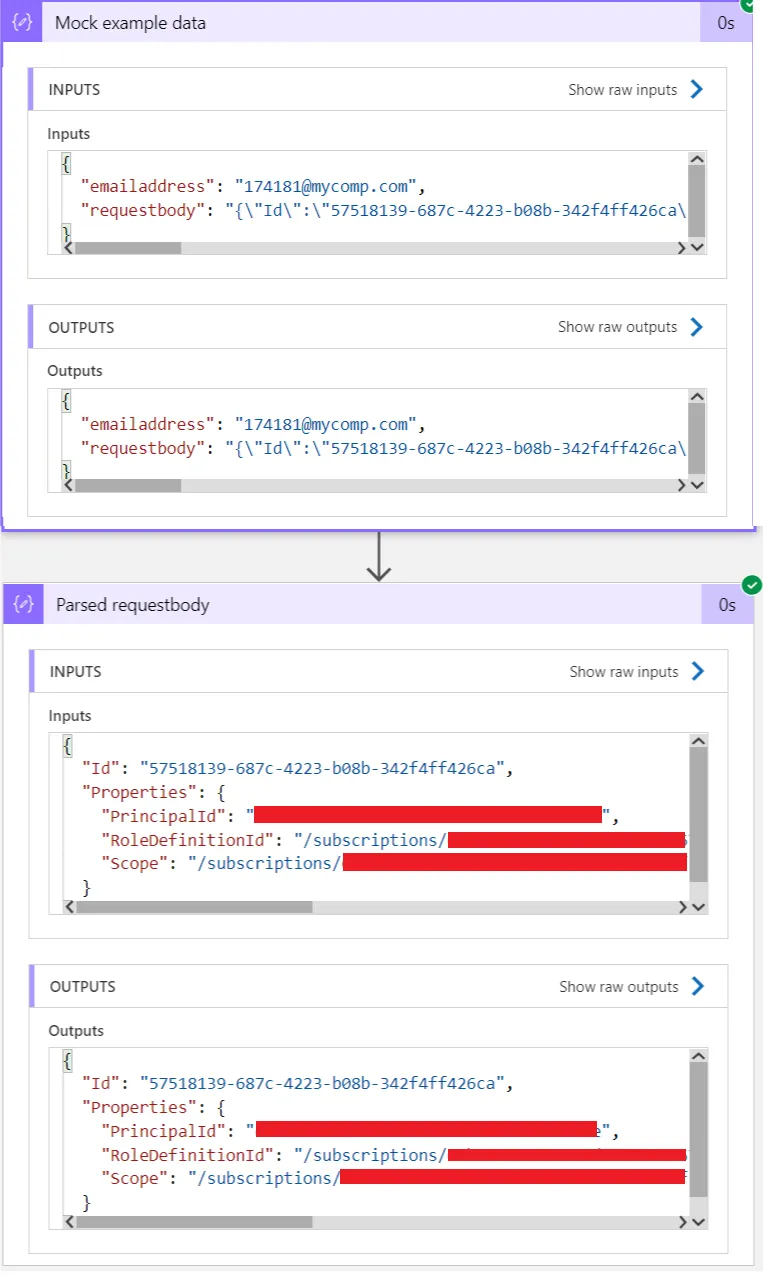使用以下Parse JSON操作:
-
内容:
{
"emailaddress": "174181@mycomp.com",
"requestbody": "{\"Id\":\"57518139-687c-4223-b08b-342f4ff426ca\",\"Properties\":{\"PrincipalId\":\"d701e7aa-5a0a-4c4a-81be-4c4b7a3967ce\",\"RoleDefinitionId\":\"/subscriptions/64ba3e4c-45e3-4d55-8132-6731cf25547f/providers/Microsoft.Authorization/roleDefinitions/8e3af657-a8ff-443c-a75c-2fe8c4bcb635\",\"Scope\":\"/subscriptions/64ba3e4c-45e3-4d55-8132-6731cf25547f\"}}"
}
模式
{
"$schema": "http://json-schema.org/draft-04/schema#",
"properties": {
"emailaddress": {
"type": "string"
},
"requestbody": {
"type": "string"
}
},
"required": [
"emailaddress",
"requestbody"
],
"type": "object"
}

- 初始化变量
-Name = Variable Name
-Type = Object
-Value = json(body('Parse_JSON')['requestbody'])

现在,您可以按照下面所示提取Json字符串的属性:
variables('jsonobj')?['Properties']

我的样例的完整代码视图:
{
"definition": {
"$schema": "https://schema.management.azure.com/providers/Microsoft.Logic/schemas/2016-06-01/workflowdefinition.json#",
"actions": {
"Initialize_variable": {
"inputs": {
"variables": [
{
"name": "jsonobj",
"type": "Object",
"value": "@json(body('Parse_JSON')['requestbody'])"
}
]
},
"runAfter": {
"Parse_JSON": [
"Succeeded"
]
},
"type": "InitializeVariable"
},
"Parse_JSON": {
"inputs": {
"content": {
"emailaddress": "174181@mycomp.com",
"requestbody": "{\"Id\":\"57518139-687c-4223-b08b-342f4ff426ca\",\"Properties\":{\"PrincipalId\":\"d701e7aa-5a0a-4c4a-81be-4c4b7a3967ce\",\"RoleDefinitionId\":\"/subscriptions/64ba3e4c-45e3-4d55-8132-6731cf25547f/providers/Microsoft.Authorization/roleDefinitions/8e3af657-a8ff-443c-a75c-2fe8c4bcb635\",\"Scope\":\"/subscriptions/64ba3e4c-45e3-4d55-8132-6731cf25547f\"}}"
},
"schema": {
"$schema": "http://json-schema.org/draft-04/schema#",
"properties": {
"emailaddress": {
"type": "string"
},
"requestbody": {
"type": "string"
}
},
"required": [
"emailaddress",
"requestbody"
],
"type": "object"
}
},
"runAfter": {},
"type": "ParseJson"
},
"Response": {
"inputs": {
"body": "@variables('jsonobj')?['Properties']",
"statusCode": 200
},
"kind": "Http",
"runAfter": {
"Initialize_variable": [
"Succeeded"
]
},
"type": "Response"
}
},
"contentVersion": "1.0.0.0",
"outputs": {},
"parameters": {},
"triggers": {
"manual": {
"inputs": {
"schema": {}
},
"kind": "Http",
"type": "Request"
}
}
}
}



